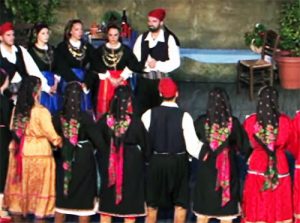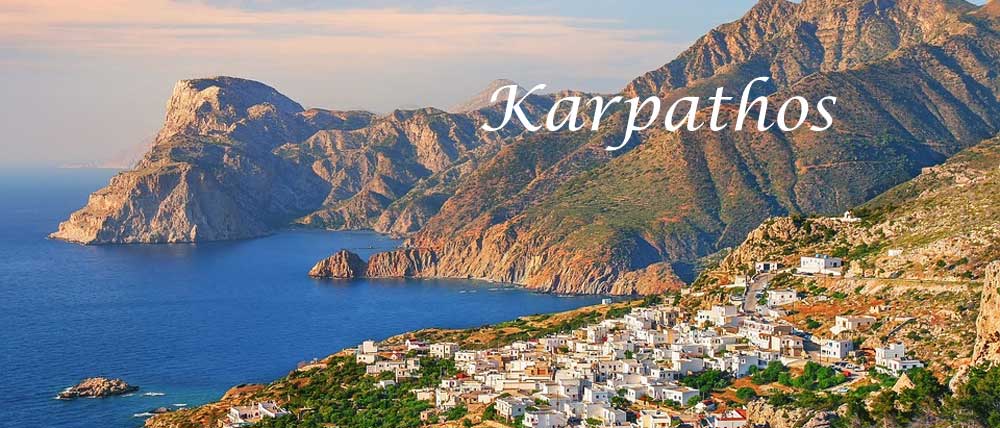Culture and tradition of Karpathos
Cultural events
Each year, a Cultural Event is hosted by the Municipality of Karpathos, featuring music concerts, thespian productions, dance performances, the revival of old customs and usages and sea promenades by oar-driven boat.
Folklore feasts and Celebrations

On the 21st of July: In various monasteries all around Karpathos masses are celebrated and those whose this is the name day organize feasts with delicious dishes and much music.
St. Panteleimon’s day is celebrated on the 27th of July, with particular emphasis in the village of Othos – traditionally protected by the saint – and that of Stes and the area around the village of Arkasas. A vesper is celebrated on the eve of the day and grand mass on the morning, followed by lunch, dancing and singing.
On the day after – the 28th – more folk dancing and music are enjoyed in the afternoon.
On the 6th of August: Feast of the Transfiguration of the Saviour, at the villages of Menetes, Orthos, Aperi and Pyles, where mass is followed by lunch and traditional celebrations.
On the 15th of August: Feast of the Dormition of the Virgin, protector of the villages of Menetes, Pyles, Olympos and Aperi. The most acclaimed of all celebrations takes place in Menetes. Mass is followed by lots of eating and drinking at the shed set up out in the church yard, whereas in the evening there takes place a traditional celebration with dancing and singing.
On the 23d of August: At Kyra Panaghia, vespers and morning mass are followed by eating and dancing.
On the 1st of September: Feast of St. Symaeon at Orthos. After morning mass, there is dancing on the church courtyard.
On the 8th of September: Feast at Pigadia amd Mesochori.
At Pigadia, vespers on the eve afternoon are follows by a feast with a wide participation of the congregation.
At Mesochori: on the Birthday of Virgin Mary, a major event is hosted, featuring religious celebration and a typical Greek feast with dancing and merrymaking until late in the evening.
On the 14th of September: Feast of the Holy Cross at Pyles and Spoa. Mass in the morning is followed by lunch and a loud feast.
On the 17th of September: Day of St. Sophia, at Arkassa. Mass in the morning lunch and dancing until late into the evening.
On the 8th of October: Feast of St. Pelagia, in the surroundings of the village of Spoa. Mass in the morning followed by lots of delicious eating and carousing.
On the 8th of November: Feast of the Archangel Michael, in Volada. Notably traditional celebrations.
On the 6th of December: feast of St. Nicholas at Finiki – village of Arkasas. Mass in the morning is followed by a lavish meal at noon and dancing and merrymaking until late into the evening.
On the 5th of January: Feast of the Epiphany, with special celebrations organized in Pigadia and Finiki. After mass, a cross is thrown into the sea and divers dive to catch it and have a blessing.
On the 2d of February: feast of the Presentation of Jesus at the Temple – this is celebration day for the village of Arkasas.
On the 10th of February: the feast dedicated to St. Charambos, saint protector of the village of Aperi. There is a preordained way for this feast to be celebrated, with a lavish lunch organized after mass, followed by much dancing and singing.
Traditional Wedding in Karpathos
The most celebrated of all feasts on the island is that of the Karpathian Traditional Wedding, Typically, the final preparations may last well over a week. Housewives take a drastic part in the process, kneading and baking cookies – the much acclaimed “leoudia” – and then go on to the home of the bride-to-be to decorate it with flowers. Slaughtering of the animals to provide the meat of the delicacies is ceremonial; so is the cutting of wood for the oven and bon fires.
On Sunday, the day for wedding celebrations – music can be heard everywhere as musicians set to their task quite early in the morning. At the family homes of the bride and the groom people arrive holding high canes waving silken kerchiefs. After the religious ceremony, the typical delicacy known as “sousamomelo” – a pastry made of sesame and honey – is distributed.
Then comes the time of the lunch, the main dish invariably being meat in bulgur – referred to as “chondros”.
In the early hours of the afternoon, dancing starts out on the church courtyard, to last until the wee hours of the morning. It is then that the guests start dancing a different kind of dance – the “foumisto” – while couplets – some of them quite spicy for the circumstance – are exchanged.
Celebrations continue well into the two days and nights to follow, first with the “antigamos” and then with various other ceremonies. On the first Sunday after the wedding, there is yet another celebration, albeit in a more closed family circle.
Christmas
On Christmas day, newly wed women are supposed to bake a sizeable cookie, commonly referred to as the “dipla”, which they offer their mothers-in-law into a basket. That same evening a feast is organized as of which the mothers-in-law are expected to return the gesture.
Carnival
On Carnival Sunday, there is a celebration with the participation of all the inhabitants. If the weather is favourable, the feast becomes an open-air event with practically everyone gathering to celebrate, dancing the “pepper dance” with the leading dancer guiding the rest to follow his steps and symbolic movements. Spicy libations and licentious altercations are in order during such festivities.
Ash Monday
On Ash Monday, Karpathos becomes alive with the so-called “Popular Court to chastise Immoral Deeds”. The role of judge is bestowed upon the most venerable of the island’s inhabitants. There is a mock circumstance with certain men indulging in obscene gestures on account of certain “women” – in fact these are also men dressed in women clothes. As the latter complain, the “police” intervenes and everybody is led before the Judges.
